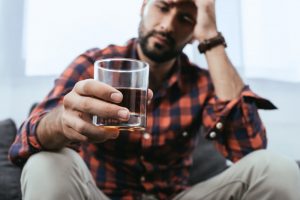Alcohol: Sleep Aid or Sleep Hindrance?
May 23, 2018

It’s not rocket science: a good night’s sleep makes you feel good, energetic, and productive, while a poor night’s sleep often makes you feel anxious, foggy, irritable, or even downright sick. And, in fact, it’s true that sleep is inextricably linked to a number of health factors. People who get enough sleep typically maintain and lose weight more easily, have better memory and cognition, and are more productive. They also reduce their risk of depression, heart disease, stroke and diabetes as compared to those who do not get enough sleep. Sleep is so important that the United States Centers for Disease Control and Prevention (CDC) recognizes insufficient sleep as a ‘public health problem.’
Among the many factors that affect sleep quality and duration, one frequent struggle that Americans face is an inability to fall and/or stay asleep. As a result, they turn to a variety of strategies to de-stress and relax into a state of mind that is conducive to falling asleep. One of the most common of these strategies is enjoying a nightcap (or two!) in the evening hours or just before bed.
A depressant, alcohol helps induce a state of relaxation and drowsiness, which explains why up to 20% of the population uses it as a sleep aid. In a 2013 review on the connection between sleep and alcohol, which covered twenty-seven studies, the general consensus was that alcohol reduces the time it takes to fall asleep. That does not, however, mean that it will help you get quality rest. With regard to sleep, alcohol is a wolf in sheep’s clothing.
Sleep problems associated with alcohol consumption
Numerous studies have shown that alcohol has a profound effect on our sleep and sleep quality. Below are a few of the significant ways that it can negatively modify or influence our natural sleep habits.
Alcohol inhibits REM sleep –– As the body metabolizes alcohol, we spend more time in deep, slow-wave sleep and less time in REM sleep. While that may sound like a good thing, it’s actually a modification of our biologically driven sleep architecture, which is fine-tuned to meet the needs of our mental and physical health and well-being. REM sleep is vital for restoring the mind and helping to process memories and emotions.
Alcohol interrupts naturally occurring sleep patterns — Alcohol also affects our circadian rhythm, which operates as the body’s biological clock by alternating our cycles of sleepiness and alertness. The consumption of alcohol interferes with how the clock synchronizes itself, meaning you might find that you wake up earlier in the morning, you sweat during the night, and/or you’re more likely to snore.
Alcohol can potentially exacerbate breathing problems — Alcohol causes our muscles to relax beyond the point they would sans alcohol, including the muscles in our throat that keep our airway open. For anyone with a sleep breathing condition such as persistent snoring, UARS, or sleep apnea (diagnosed or undiagnosed), this is particularly worrisome for your ability to get quality sleep.
In addition to the above, alcohol can also lead to frequent waking to get up and use the restroom and an increased risk for sleepwalking and sleep eating.
Does all this mean that you shouldn’t enjoy a drink prior to bed? Not necessarily. Many of the negative effects of alcohol on sleep can be greatly reduced or eliminated by changing the amount you consume at one time and by increasing the amount of time between your last drink and your bedtime.
With or without alcohol consumption as a consideration, if you think you might be suffering from a sleep breathing condition such as persistent snoring or sleep apnea, contact Dr. Kent Smith of Sleep Dallas or a sleep expert in your area who can help you diagnose and treat your condition.
